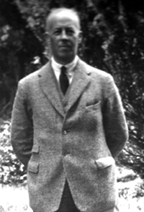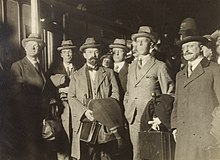Robert Barton
Robert Barton | |
|---|---|
 | |
| Director of Agriculture | |
| In office 2 April 1919 – 26 August 1921 | |
| Preceded by | New office |
| Succeeded by | Art O'Connor |
| Teachta Dála | |
| In office May 1921 – June 1923 | |
| Constituency | Kildare–Wicklow |
| In office December 1918 – May 1921 | |
| Constituency | West Wicklow |
| Personal details | |
| Born | Robert Childers Barton 14 March 1881 Annamoe, County Wicklow, Ireland |
| Died | 10 August 1975 (aged 94) Annamoe, County Wicklow, Ireland |
| Nationality | Irish |
| Political party | Sinn Féin |
| Spouse(s) | Rachel Warren
(m. 1951; died 1972) |
| Relatives | Erskine Childers (cousin) |
| Alma mater | Christ Church, Oxford |
| Occupation | Landowner |
Robert Childers Barton (14 March 1881 – 10 August 1975)[1] was an Irish nationalist, politician and farmer who participated in the negotiations leading up to the signature of the Anglo-Irish Treaty. His father was Charles William Barton and his mother was Agnes Alexandra Frances Childers. His wife was Rachel Warren of Boston, daughter of Fiske Warren. His double first cousin and close friend was Erskine Childers.[2]
Early life[]
He was born in County Wicklow into a wealthy Irish Protestant land-owning family; namely of Glendalough House.[2][3] Educated in England at Rugby and Oxford, he became an officer in the Royal Dublin Fusiliers on the outbreak of the First World War. He was stationed in Dublin during the 1916 Easter Rising and came into contact with many of its imprisoned leaders in the aftermath while on duty at Richmond Barracks.[4] He resigned his commission in protest at the heavy-handed British government suppression of the revolt. He then joined the Republican movement[5]
Family[]
Charles William Barton (father) was born on 13 July 1836. He married Agnes Alexandra Frances Childers, daughter of Rev. Canon Charles Childers, on 26 October 1876. He died on 3 October 1890 at age 54. Robert's two younger brothers, Erskine and Thomas, died in the British Army during the First World War.[6]
Politics[]
At the 1918 general election to the British House of Commons Barton was elected as the Sinn Féin member for West Wicklow.[7] In common with all Sinn Féin members, he boycotted the Westminster parliament and instead sat in Dáil Éireann (the "First Dáil"). Arrested in February 1919 for sedition, he escaped from Mountjoy Prison on St. Patrick's Day (leaving a note to the governor explaining that, owing to the discomfort of his cell, the occupant felt compelled to leave, and requesting the governor to keep his luggage until he sent for it). He was recaptured in January 1920 and sentenced to three years' imprisonment, but was released under the general amnesty of July 1921.

In May of that year, prior to his release, he was elected as a Sinn Féin member for Kildare–Wicklow in the 1921 Irish election to the House of Commons of Southern Ireland.[8] Once again all Sinn Féin members boycotted this parliament, hence Barton sat instead in the "Second Dáil" of Dáil Éireann. He was appointed Minister for Agriculture of the Irish Republic,[9] then of Economic Affairs. Barton was one of the Irish delegates, along with his cousin, to travel to London for the Anglo-Irish Treaty negotiations.[10][11] He reluctantly signed the Treaty on 6 December 1921, defending it "as the lesser of two outrages forced upon me and between which I had to choose." He nevertheless was firmly committed to the Irish Republic and despite signing the Treaty rejected it.
He won re-election to Dáil Éireann in June 1922 (the "3rd Dáil") as the only signatory of the Anglo-Irish Treaty to stand for the Sinn Féin (Anti-Treaty) party, but did not take his seat. In October 1922 he was appointed Minister for Economic Affairs in De Valera's "Emergency Government", that never functioned. Barton's memoir of this period was completed in 1954, and can be seen on the Bureau of Military History website. He was arrested and interned for most of the war at the Curragh Camp.[12]
After being defeated at the 1923 general election,[8] he retired from politics for the law, practicing as a barrister. He later became a judge.[13] He was chairman of the Agricultural Credit Corporation from 1934 to 1954. Barton died at home in County Wicklow on 10 August 1975, at the age of 94, the last surviving signatory of the Anglo-Irish Treaty. Éamon de Valera died only nineteen days later, on 29 August 1975.
Interview[]
In 1969, RTÉ Television interviewed Barton, alongside Ernest Blythe and James Ryan about the 1918 general election.[14][15]
Glendalough House[]
Glendalough House, run by Barton[2][16] for over 70 years right up until his death, is still considered one of Ireland's most notable properties;[17] alongside nearby Powerscourt Estate. The house was the center of numerous political meetings and gatherings from 1910 to 1922.[18] It's also been featured as a location in many large Hollywood films including Excalibur[19] Saving Private Ryan and Braveheart.[17][20]
Barton's great-great-grandfather, Thomas Barton, also of Glendalough House,[16] was the founder and owner of the award-winning Langoa & Barton vineyards in France. Since 1836, the vineyards have been under the control of the Barton family. The Châteaux Langoa & Léoville Barton passed to the Straffan branch of the Barton family and are currently managed by Anthony Frederick Barton and his daughter, Lilian Anna Barton. He was preceded by his uncle, Major Hugh Ronald Barton ("Ronald"), Chairman, Barton & Guestier, wine shippers, Bordeaux. The Straffan Estate was sold by Captain Frederick Bertram Barton ("Derick") in 1949, a father to Anthony Frederick and brother to Ronald. He lived in Blackrock, County Dublin thereafter.
References[]
- ^ "Person Page". www.thepeerage.com. Retrieved 8 October 2018.
- ^ Jump up to: a b c "Barton Collection". Wicklow County Archives. Archived from the original on 25 April 2012. Retrieved 21 April 2012.
- ^ "Welcome to Glendalough Estates". glendaloughestates.com. Archived from the original on 25 March 2004.
- ^ O'Connor, Batt (1929). With Michael Collins in the fight for Irish independence. P. Davies, ltd. p. 60. ASIN B00086A93Y.
- ^ "Irish Appalled At Death of Collins; Fell Fighting with Victory at Hand; Dail Meets Soon to Seek New Leader; Ireland's Future in Doubt" (PDF). The New York Times. 24 August 1922. Retrieved 19 May 2021.
- ^ "Statement by Miss Dulcibella Barto" (PDF). bureauofmilitaryhistory.ie. 31 March 1954. Archived from the original (PDF) on 3 March 2016.
- ^ "Robert Barton". Oireachtas Members Database. Retrieved 21 November 2011.
- ^ Jump up to: a b "Robert Barton". ElectionsIreland.org. Retrieved 21 November 2011.
- ^ "DáIL éIreann - Volume 4 - 23 August, 1921 : Department of Agriculture Report". historical-debates.oireachtas.ie. 23 August 1921. Archived from the original on 7 June 2011. Retrieved 8 October 2018.
- ^ "Stock Photography, Royalty-Free Photos & The Latest News Pictures - Getty Images". pro.corbis.com. Retrieved 8 October 2018.
- ^ "Stock Photography, Royalty-Free Photos & The Latest News Pictures - Getty Images". pro.corbis.com. Retrieved 8 October 2018.
- ^ "Statement by Witness - Document No. W.S. 979" (PDF). militaryarchives.ie. 27 July 1954. Retrieved 19 May 2021.
- ^ Richardson, Neil (2015). According to their Lights. Gill & Macmillan.
- ^ "Standing For An Irish Parliament". RTÉ Archives.
- ^ "Features". RTÉ News. 18 April 2006.
- ^ Jump up to: a b Raineval, Melville Henry Massue marquis de Ruvigny et (1 January 1994). The Plantagenet Roll of the Blood Royal: Being a Complete Table of All the Descendants Now Living of Edward III, King of England. The Anne of Exeter volume. Genealogical Publishing Company. ISBN 9780806314334.
- ^ Jump up to: a b "Glendalough court case dropped: ThePost.ie". Retrieved 8 October 2018.
- ^ Boyle, Andrew. "The Riddle of Erskine Childers" (Hutchinson) (1977) ISBN 0-09-128490-2. p.249
- ^ "Excalibur (1981)". Retrieved 8 October 2018 – via www.imdb.com.
- ^ "Wicklow Film Commission - Filming in Ireland". Retrieved 8 October 2018.
- 1881 births
- 1975 deaths
- Politicians from County Wicklow
- Irish Protestants
- Protestant Irish nationalists
- People educated at Rugby School
- Royal Dublin Fusiliers officers
- Early Sinn Féin TDs
- Members of the 1st Dáil
- Members of the 2nd Dáil
- Members of the 3rd Dáil
- Members of the Parliament of the United Kingdom for County Wicklow constituencies (1801–1922)
- UK MPs 1918–1922
- Childers family
- Irish judges
- British Army personnel of World War I
- People of the Irish Civil War (Anti-Treaty side)
- The Irish Press people
- Ministers for Agriculture (Ireland)
- Sinn Féin MPs (pre-1921)